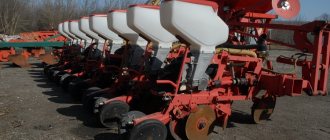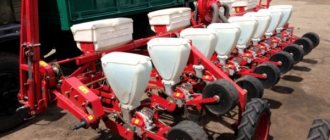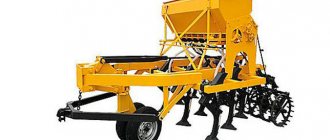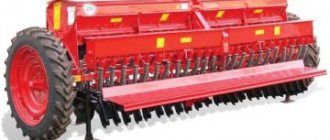Mineral fertilizer spreader RUM-5
This device has been made since 1985 in the city of Neftekamsk, at the Bashselmash enterprise. Its more modern name is MVU-5. Factory designers have developed a unit very similar to the popular 1-RMG-4 spreader. The differences between the new machine, attached to the MTZ-80, are the operation of all mechanisms from the tractor power take-off shaft, as well as the chassis, made of the “tandem” type. The design became more advanced over time, but did not undergo fundamental changes.
Purpose
With this unit it is possible to fertilize the soil with solids of varying densities in the form of powder, granules or crystals. In particular, it can be ammonium nitrate, superphosphate, potassium salt, dolomite and lime flour, and other fertilizers. They can be applied to the soil in spring or autumn, as well as summer feeding of intensively growing grains.
The spreader can be used in all regions except highlands. With its help, not only fertilizers are scattered and transported, but also sand, lime, and various chemical substances in a granular state.
Advantages and disadvantages
Advantages:
- Easy unit setup, ease of use.
- Regulating the dose of fertilizer by changing the height of the sowing slot. The instructions for the machine provide this data for each type of fertilizer.
- It is possible to scatter useful substances both across the entire width of the field, and only along the edges or in the middle.
- The presence of a mechanism that ensures maximum uniformity of fertilizing across the entire width (to the maximum).
Flaws:
- Compared to mounted spreaders equipped with a very precise dosing system, the uniformity of operation is slightly lower.
- Inability to move independently - you need a tractor.
Photo of mineral fertilizer spreader RUM-5
TECHNOLOGY OF APPLICATION
1. Preparation of the working solution / solution consumption rate
| Transport speed, km/h, no more | 25 |
| Range of application doses, kg/ha | 100-1000 |
| Maximum loading height (from the ground surface), mm, no more | 2500 |
| The number of personnel required to service operations directly related to the operation of the machine, | 1 |
| Machine dry weight, structural, kg | 2060 |
| Overall dimensions, mm - length - width - height | 5350 2152 2000 |
| Load capacity, kg, no more | 5000 |
| Track, mm | 1800 |
| Ground clearance, mm, not less | 350 |
| Drive of working bodies: -conveyor -dispersing bodies | PTO PTO |
| Basic aggregation | MTZ-80 |
| Tires (size) | 12-16 |
| Tire air pressure, MPa | 0,25 |
| Distribution along the axles at full weight: - along the axles - on the hydraulic hook of the tractor | 1200 5860 |
| Time, application features | WORKING SOLUTION | Weight / processing area | |
| Stimulife | Water or tank mixture | ||
| Application to the soil before sowing | 0.5 l | 100-300 l | 1 ha |
| Pre-sowing seed treatment | 0.05 l (!) | 10 – 20 l | 1 t seeds |
| Foliar feeding (1-3 times during the growing season) | 0.3 l | 50 – 300 l (depending on the flow rate used) | 1 ha |
| Root feeding through various irrigation systems (1-3 times during the growing season) | 0.3 l | 50 – 300 l (depending on the flow rate used) | 1 ha |
The fertilizer can be used either alone or in a mixture with mineral and organic fertilizers, or against their background (in this option, the efficiency in the form of yield increases significantly).
To improve the structure of the soil, increase the content of organic matter and easily digestible nutrients in it, “Stimulife” is applied to the soil in the form of a working solution with a concentration of 0.1% of the main substance.
During tests in the fields of the Leningrad region, the result was obtained: for grains the increase was up to 30% of the harvest, and for beets and cabbage up to 50%
Regulations for the use of the drug "Stimulife":
| Culture | Treatment of seeds (seedlings) | Treatment during the growing season (foliar) | ||
| 1st spray | 2nd spray | 3rd (4) spray | ||
| Winter and spring wheat, Winter rye, Oats, Winter and spring barley | Seed dressing | tillering phase | in the phase of the beginning of egress into the tube | in the flowering phase - the beginning of milky ripeness |
| Corn | Seed dressing | in the phase of appearance of 3-5 leaves | in 10-15 days | in 10-15 days |
| Buckwheat | Seed dressing | in the branching phase - the beginning of budding | in 10-15 days | |
| Millet, Sorghum | Seed dressing | in the tillering phase | spraying during the panicle sweeping phase | |
| Peas, Soybeans | Seed dressing | in the germination phase – 2-3 leaves | in the phase of 5-6 leaves - budding | during the flowering phase |
| Millet, Clover, Alfalfa | Seed dressing | during the emergence phase | during the plant growth phase | in the stemming phase |
| Winter and spring rapeseed, winter and spring rapeseed | Seed dressing | during the germination phase – the appearance of the first pair of true leaves | in the phase of the beginning of the formation of a leaf rosette - branching | at the beginning of budding |
| Linen | Seed dressing | spraying during the herringbone phase | with an interval of 15-20 days | at intervals of 15 days |
| Sunflower | Seed dressing | in the germination phase | in the phase of formation of 3-4 pairs of leaves | at intervals of 15 days |
| Sugar beet, Table beet | Seed dressing | in the sprouting phase – 2-3 true leaves | in the phase of 4 pairs of true leaves - closing of plants in rows | |
| Potato | Soaking tubers before planting - 15 hours. | during the emergence phase | in the budding phase | |
| Flower crops | Soaking tubers, bulbs, cuttings, seeds – 15 hours. | in the germination phase – 2-3 leaves | in the phase of appearance of 5-7 leaves | in the budding phase |
| Tomatoes, Cucumbers, Zucchini, Squash, Eggplant | Soaking seeds before planting – 18-20 hours. | in the phase of appearance of 2-4 leaves | in the budding phase | at the beginning of flowering (in the fruiting phase) |
| Cabbage | Soaking seeds before planting – 15 hours. | 2-3 days after planting seedlings | in the phase of leaf whorl - setting of heads of cabbage | 10-12 days after the second |
| Carrot | Soaking seeds before planting – 15 hours. | in the germination phase - the formation of 1-2 true leaves | in the phase of the 2nd true leaf | 10-15 days after the previous one |
| Onion, Radish | Soaking seeds before planting – 15 hours. | in the phase of appearance of 2-3 leaves | in 10-15 days | in 10-15 days |
Device
The metal frame is equipped with a drawbar and a loop for attachment to the tractor. The five-ton welded body, where fertilizers are poured, is part of the frame. There is a plate-and-rod type conveyor located inside the body. It is driven either by the tractor power take-off shaft (if more than six tons of fertilizer is applied per hectare), or (with less fertilizer) by a shaft located inside the axle shaft of the right rear running wheel.
The conveyor delivers the bulk mass to centrifugal-type seeding discs, each of which is equipped with four blades with grooves fixed perpendicular to each other. The movement on them comes from the tractor PTO. The transmission of motion involves a cardan, bevel-type gearboxes, V-belt-type profiles and satellite shafts.
To ensure that fertilizers are unloaded more evenly, the body has a bimetallic fertilizer guide panel installed on the side supports. The dosing gate, moving on skids at the rear of the body, is controlled by a steering wheel mounted on the shaft. Two sprockets that engage with the slats allow you to adjust the height of the damper.
The chassis is a trolley with balancers, designed as a “tandem” type and without springs. The split-type wheel is attached with six studs and nuts to the hub, which has a drum for braking. The unit has two types of brakes: mechanical (intended for braking while parking) and pneumatic, single-line. The latter is controlled from the tractor cabin by a pedal. You can manually brake using a crane. At the same time, the front wheels stop.
There is a plug for connection to the tractor's electrical system. Alarm devices are connected with a separate wiring harness. There are two lights at the rear of the unit.
RUM-5 spreader diagram
1 - bunker; 2 — feeder: 3 — drum-chopper; 4 - counter plate; 5 - separating device; 6 - rotor; 7 - conveyor
Seed protectant PS-20M-4 “MAESTRO”
- Pickup width – 2 meters
- Working tank capacity – 300 liters
- The height of the unloading auger is 2.8 meters
- Productivity (wheat) – up to 20 t/h
- Power consumption – up to 6 kW
- Working equipment – Italy
Features of the model that increase reliability and ease of use:
- Familiar layout on four wheels with steering wheel and seat
- Two speeds: working and transport
- Two operating modes: high collar and low collar
- Bearing units on wheel hubs
- All controls are on one side
- Free access for maintenance and repair of unit components.
- A simple and reliable system for setting the supply of working solution using a calibrated nozzle and pressure gauge
- Visual inspection and quick check using a measuring cup
- Clear customized table
- Mixing the working solution with a hydraulic mixer
- Professional Italian pump Pedrollo.
A professional polyethylene 300-liter container that does not corrode, with a large and convenient neck, with a filter for filtering the working solution, a lid with a breathing valve and a level meter.
– Ease of use and safety in operation – this is the new credo in the updated version of the PS-20M4.
– The gearbox was replaced with a professional maintenance-free Czech geared motor from TOZ ZNOJMO.
Automation and individual components of mechanisms are equipped with safety relays, which helps protect against overloads and injuries.
Reliable push sensors for synchronizing the supply of suspension and seeds and automating the dressing process.
To control the supply of the working solution, a liquid supply control sensor is installed.
Another innovation of the machine is the absence of an intermediate auger, which makes it possible to unload from the mixing chamber onto the vehicle.
The height of the unloading auger is 2.8 meters, allowing you to load vehicles with extended sides.
Comparative characteristics of pickling machines PS-10 and PS-20 M 4.
Specifications
Technical characteristics of the RUM-5 mineral fertilizer spreader:
| Characteristics | Indicators | Unit measurements |
| Spreading granules: | ||
| Performance (at 12 km/h) | up to 148000 | m2/h |
| Capture | 14-20 | m |
| Spreading crystalline fertilizers: | ||
| Performance (at 12 km/h) | up to 80000 | m2/h |
| Capture | 10-14 | m |
| Powder spreading: | ||
| Performance (at 12 km/h) | up to 40000 | m2/h |
| Capture | 8-12 | m |
| Common parameters: | ||
| Device type | semi-trailer | |
| Main tractor class | MTZ-80 and MTZ-82 | |
| Tractor traction class | 1,4 | |
| Load capacity (maximum) | 5 | T |
| Speed (operating) | up to 15 | km/h |
| Speed (transport) | up to 25 | km/h |
| Fertilizer application rate | 10-100 | g/m2 |
| Height (loading, from ground) | up to 2.5 | m |
| Track | 1,8 | m |
| Longitudinal base | 3,73 | m |
| Clearance | 0,35 | m |
| Weight (structural, dry) | 2,06 | T |
| Length | 5,35 | m |
| Height | 2 | m |
| Width | 2,152 | m |
The video shows the operating principle of the RUM-5 fertilizer spreader using the MVU-6 model as an example:
STIMULIFE
A unique organo-mineral complex that provides multifunctional regulation of the growth and development of cultivated crops (developed with the participation of the Agrophysical Research Institute of the Russian Academy of Agricultural Sciences, St. Petersburg)
It is used for pre-sowing treatment of seeds, seedlings, seedlings by soaking and foliar and root spraying of vegetative plants of all types of agricultural crops.
- increases the yield of agricultural crops by 20% or more,
- increases the germination rate of seed material by 7-9%
- promotes seedling survival and better rooting of seedlings
- increases the content of valuable substances in plants
- increases plant resistance to abiotic (soil moisture deficiency, unfavorable temperature of the habitat, increased levels of UV-B radiation, etc.) and biotic stressors (phytopathogenic microorganisms and pests)
- significantly reduces nitrate content
- increases the effectiveness of mineral fertilizers and pesticides when used in tank mixtures
- Suitable for all agricultural crops in all soil and climatic zones
- absolutely safe for humans and warm-blooded animals
- easy to use when processing crops,
- During production, a unique filtration system is used - it does not clog the spray nozzles
- average consumption of the drug – 0.3 – 0.4 l/ha
- instant
When processing a plot of 1 hectare during the growing season, you will need 0.1-0.3 liters. For processing seed material, the consumption will be 0.05 liters. per ton.
Stimulife contains more than 30 elements of mineral and organic substances, including:
- nitrogen (N) > 10%, included mainly in heterocycles of the aromatic matrix
- microelements, incl. silicon in plant-available chelated form
- phytohormones of cytokinin and auxin type
- fulvic acids and amino acids
- microelements
Manufacturer Unia
Unia is a large Polish manufacturer of agricultural machinery. Stands out for its high sales and exports throughout the world. Production is concentrated in Grudziedz, Brzeg, Slupsk, Wrocławskie Konty. These factories are equipped with modern design offices, processing centers and lasers.
All 5 factories occupy a production area of 11.5 hectares. The total number of employees in the company is about 1,500 people. Union produces various types of equipment for agricultural needs.
Organic application machines
All agricultural machinery that applies organic matter to fields is conventionally divided into units for spreading solid and liquid fertilizers. The design features and principles of operation of such mechanisms are practically no different from similar devices for applying mineral fertilizers, but equipment for organic matter usually has a larger body capacity, since the dosage of natural fertilizers is significantly higher than the dosage of fertilizers produced by the chemical industry.
Spreader ROU-6. Advantages and disadvantages
This unit is a device equipped with a 4-wheel trailed chassis and a body with a spreading mechanism connected to the power take-off shaft of the tractor itself. Thanks to its modern, well-thought-out design, the machine is quite popular among agricultural producers. Among its advantages:
- easy-to-use organic feed mechanism;
- availability of automatic control of fertilizing application rates;
- Ease of Management;
- possibility of transformation into a regular trolley for transporting goods.
The only disadvantage of the ROU-6 is its “non-self-propelled” nature: the operation of the unit is ensured by an appropriate traction vehicle (wheeled tractor).
Box compost spreader
The unit for spreading compost and other solid organic fertilizers is a multifunctional device consisting of a 4-wheeled chassis and a “box” body with an opening in the lower part for uniform distribution of fertilizing mixtures over the soil surface.
Agrotechnical requirements for the application process
The implementation of operations to restore the mineral balance of agricultural lands must meet the following most important criteria:
- uniform spreading of fertilizers over the cultivated areas;
- absence of foreign objects in nutritional mixtures;
- ensuring the overlap of adjacent passages, preventing mistakes;
- no untreated headlands;
- compliance with the required depth level (permissible deviation - no more than 15%);
- maintaining time intervals between spreading and embedding nutrient mixtures (mineral fertilizers - no more than 12 hours, organic fertilizers - maximum 2 hours).
Only if all the listed conditions are met, fertilizing will have maximum efficiency and usefulness for cultivated plants grown in treated fields.











